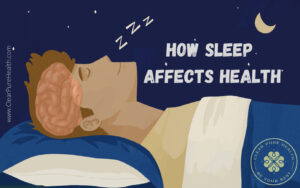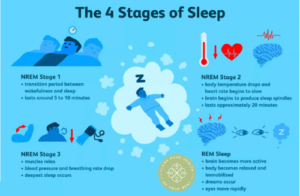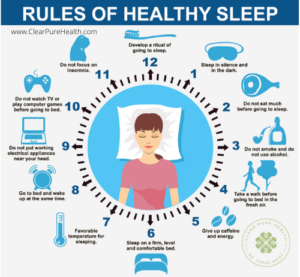How Sleep Affects Health

How Sleep Affects Health
Sleep is one of the most underrated and forgotten aspects of our health. How sleep affects health is an ever-evolving story. Science and research in sleep have shown us that sleep connects nutrition, exercise, immune response, mindfulness and cognitive ability, to name a few.
Like regular exercise and a healthy diet, getting enough good quality sleep is essential for looking after our health. A poor nights sleep can have adverse health consequences and makes for a challenging day come morning time. Whereas when we have a restful nights sleep, we feel unstoppable and ready to take the day head-on with bags of energy and a positive mindset.
How Sleep Benefits Health
Research has shown how sleep affects health; let’s take a look at some of the health benefits of sleep and why it’s important to make sleep a priority.
- Improve your attention and concentration
We’ve all been there; you have a terrible nights sleep and wake up feeling drained first thing; how will you make it through the day? You find it difficult to concentrate or focus on work, will power is low bad food choices follow as you try to boost your energy to make it through the day.
Not getting enough good quality sleep could impair your attention span, concentration, strategic thinking, risk assessment and reaction times.
- Learn and make memories
We know that your body repairs muscle tissue when we sleep but did you know it does the same for the mind? As you sleep, your brain begins to organise and process all the information you’ve taken on during the day. It converts your short-term memories into long-term memories. This time for the brain to reorganise helps you learn and means that you can often see things more clearly when you wake up.
- Maintain a Healthy Weight
Getting enough sleep plays a massive role in weight loss. Studies reveal that individuals who are exhausted and sleep less are more likely to be obese or overweight. One reason could be that sleep deprivation directly affects the ghrelin and leptin hormone levels, closely associated with hunger feelings.
The ghrelin hormones increase, triggering your appetite, while the levels of leptin hormone responsible for alerting your body you’re satisfied reduces making you unnecessarily eat more.
Also, lack of enough sleep (whether caused by untreated sleep apnea, insomnia, self-induced, or any other sleep disorders) often results in metabolic dysregulation.
In general, the extra time spent awake may increase the chances of eating more, whereas sleeping less might disrupt your circadian rhythms, resulting in weight gain.
Besides, when you feel tired, you’ll probably not want to be active or move around. Altogether, it’s a contributing factor to the extra pounds. The time to spend sleeping goes hand-in-hand with the time spent at the gym and table to help you manage your weight. Read More about Weight loss Hormones Here
- Healthy Heart
Regular poor quality Sleep has been shown to increased your risk of Diabetes, High Blood Pressure and even Coronary Heart Disease. Long-standing sleep deprivation seems to be associated with increased heart rate, increased blood pressure and higher levels of certain chemicals linked with inflammation, which may put extra strain on your heart.
- Learn and make memories
We know that your body repairs muscle tissue when we sleep but did you know it does the same for the mind? As you sleep, your brain begins to organise and process all the information you’ve taken on during the day. It converts your short-term memories into long-term memories. This rest helps you learn and means that you can often see things more clearly when you wake up.
- Strong Immune System
Sleeping gives your body the time and resources to repair the body; this includes the time to clear the body of toxins and, by doing so, replenishes the immune system and your lymphatic system. This time asleep gives your body time to remove toxins and gets you ready for following the day’s workload. Read more about the Lymphatic System here.
- Improves Mental Health
Adequate sleep and your mental health also go hand-in-hand. While you are asleep, your brain processes your emotions. Therefore, your mind requires this time to recognise and react appropriately.
Sleep deprivation may affect your brain activity. In turn, this may dampen your thinking and mood. According to studies, individuals who have insomnia are at greater risk of suffering mental health conditions such as anxiety or depression.
Anxiety and depression may also trigger sleep issues, including experiencing trouble falling or staying asleep. At the time, you may also find yourself sleeping for longer than expected, which may affect your life quality. If you continue skimping on your sleep, you tend to experience lesser positive emotional reactions and more negative ones. In simpler terms, enough sleep = better mental health.
That said, it’s evident that sleep has numerous benefits to your health. While there will always be the flows and ebbs in your sleeping patterns, we hope this article convinces you enough to aim for the best sleep routine and certainly 8-9 hours (adults) of rest per day so that your body and mind can enjoy the full benefits.
If you experience difficulties in enhancing your sleep quality, you can talk to a health practitioner. They might recommend therapies, medications, or lifestyle adjustments to help enjoy a good night’s sleep.
Not All Sleep is Equal
As mentioned earlier, not all sleep is the same; from time to time, you can get away with a quick afternoon safety snooze to power you through the rest of the day but during the night is when your quality of sleep matters.
New research shows how the depth of sleep, particularly at night, can impact our brain’s ability to wash away waste and toxic proteins efficiently. Because sleep often becomes increasingly lighter and more disrupted as we become older, the study reinforces and potentially explains the links between ageing, sleep deprivation, and heightened risk for Alzheimer’s disease.
Sleep is critical to the function of the brain’s waste removal system, and this study shows that the deeper the sleep, the better.
The Sleep Cycle
As we drift off to sleep at night, we enter into the sleep cycle. The Sleep cycle has four stages of sleep; each has its place to replenish and repair our mind and body for the coming day.
Typically, an individual gets through four sleep cycles, and though not all sleep cycles are of the same length, they averagely last for up to 90 minutes each. The four sleep cycles comprise rapid eye movement (REM) and three for non-REM (NREM) sleep. NREM comprises three varying stages. The longer the stage, the harder it is for one to wake up from their slumber.

Stage 1: N1
Typically, N1 is the dozing off’ stage that generally lasts for only one-to-five minutes. During this stage, the body isn’t entirely relaxed, although the brain and body activities begin slowing with periods of slight movements (twitches).
It’s relatively easy to wake someone during this sleep stage, but if left undisturbed, they can move swiftly to stage 2. As the night unfolds with minimal interruptions, the individual might move quickly from one stage to another.
Stage 2: N2
During this stage, the body joins a more relaxed state, comprising a fall in temperature, slowed breathing & heart rate, and subdued muscles, while the brainwave activity reveals a new pattern and the eye movement halts. Generally, the slowed brain activity is associated with brief bursts of activity, which help avoid being awoken by external stimuli.
This stage may last for 10-25 minutes during the initial sleep cycle, and every N2 stage might lengthen throughout the night. As a whole, one spends about half of their night’s sleep on stage N2.
Stage 3: N3
Also referred to as deep sleep, it’s very difficult to wake an individual in stage 3. Breathing, muscle tone, and pulse rate significantly reduce in stage N3 as the body relaxes further. The brainwave activity shows a recognisable pattern known as the delta waves; hence, this phase may also be referred to as short-wave or delta sleep.
According to sleep professionals, this stage is quite vital for restoration, as it allows the body to recover and grow fully. This sleep stage is when the body re-organises the mind, replenishes muscle cells, and enhances its immunity and other crucial body processes. Despite the reduced brain activity, evidence reveals that deep sleep attributes creativity, memory, and insightful thinking.
In the first half of the night, most of the time is spent on deep sleep and often lasts for twenty to forty minutes. This is the time the body spends rebuilding and composing itself for the coming day. As the night unfolds, this phase gets shorter, and more time is spent on REM sleep instead.
REM Sleep Patterns
In this stage, the brain activity resumes, close to the levels witnessed when you’re fully awake. Concurrently. The body experiences Antonia (temporary paralysis of the muscles) with the exceptions of the eyes and muscles responsible for breathing. Although your eyes are closed, another person can see them moving rapidly- hence, the name “Rapid Eye Movement” stage.
The REM stage is vital for cognitive functions, such as memory, creativity, and learning. Also, it’s known to bear the most vivid dreams, which is often explained by the resurge of brain activity. Though dreams can happen in any sleep stage, they’re less intense and common in the NREM stages.
In most circumstances, you cannot enter the REM sleep stage until you have been asleep for up to 90 minutes. As the night unfolds, the REM stage prolongs, particularly in the second half of the night. Although the initial REM stage might last for just several minutes, the later phases may go for about an hour, totalling up to about 25% of sleep for adults.
What Is The Significance Of Sleep Stages?
Sleep stages are vital because they let the body and brain recover and develop. Lack of sufficient NREM and REM sleep might result in some severe consequences of deprived sleep on emotions, physical health, and thinking.
Sleepers, who regularly awaken during the early sleep stages, for instance, individuals suffering from sleep apnea, might struggle properly cycling into the deeper sleep stages. Even so, persons experiencing insomnia might fail to get adequate sleep to accumulate the required time for every stage.
What Is Sleep Quality?
Sleep quality differs from sleep quantity. Sleep quantity calculates how much sleep you receive every night, whereas sleep quality measures how well or restful your sleep is. Measuring sleep quantity is straightforward, as it is quick to establish if you are receiving the recommended amount of sleep every night.
On the other hand, measuring sleep quality is more of an art compared to a science. Generally, good sleep quality can be explained by the following characteristics:
- Falling asleep immediately after getting into bad, in 20 minutes or less.
- Generally sleep well, only waking up once, at most, during the entire night.
- You fall back asleep in less than 20 minutes in case you wake up.
- Always sleep for the recommended number of hours.
- You feel restored, energised, and rested after waking up in the morning.
On the flip side, poor quality sleep is the type that leaves you counting sheep or staring at the ceiling. Poor sleep might be characterised by experiencing trouble falling or staying asleep, early awakenings, and restlessness.
To enjoy better quality sleep, you can develop a sleep routine, reduce caffeine intake, avoid blue light exposure (especially in the evening), and many more.
Even though the recommended amount of sleep varies slightly among individuals, most healthy adults need about 7 to 9 hours every 24 hours. The sleep requirements for teenagers and children are often higher: teens require 8-10 hours per day, whereas children need up to 10-14 hours per day, whereas infants need around 17 hours of sleep daily.
Sleep Routine

Anyone with babies or young kids knows the importance of getting into a good sleep routine. We now know how sleep affects health, and a good sleep routine can maximise the health benefits each night.
Follow these tips to establish healthy sleep habits:
- Keep a consistent sleep schedule. Get up at the same time every day, even on weekends or during vacations.
- Set a bedtime that is early enough for you to get at least 7 hours of sleep.
- Don’t go to bed unless you are sleepy.
- If you don’t fall asleep after 20 minutes, get out of bed. (almost impossible for me anyway)
- Establish a relaxing bedtime routine, brush teeth, read a book, devices away from the bed.
- Use your bed only for sleep and sex.
- Make your bedroom quiet and relaxing. Keep the room at a comfortable, cool temperature.
- Limit exposure to bright light in the evenings.
- Turn off electronic devices at least 30 minutes before bedtime, including TV and Phones.
- Don’t eat a large meal before bedtime. If you are hungry at night, eat a light, healthy snack.
- Exercise regularly and maintain a healthy diet.
- Avoid consuming caffeine in the late afternoon or evening.
- Avoid consuming alcohol before bedtime.
- Reduce your fluid intake before bedtime.
This list is by no mean an exhaustive list; it’s merely to point you in the right direction. Everyone
lead’s different lives and had priorities that may dictate your sleep cycle. It’s just a case of finding what works for your circumstances and fine-tuning over time. When my kids were babies,
sleep was a commodity worth more than Gold in our house, now the time has moved on, and even the kids
love the quiet and tranquil time in the land of zzzz.
How Sleep Affects Health Read More »
